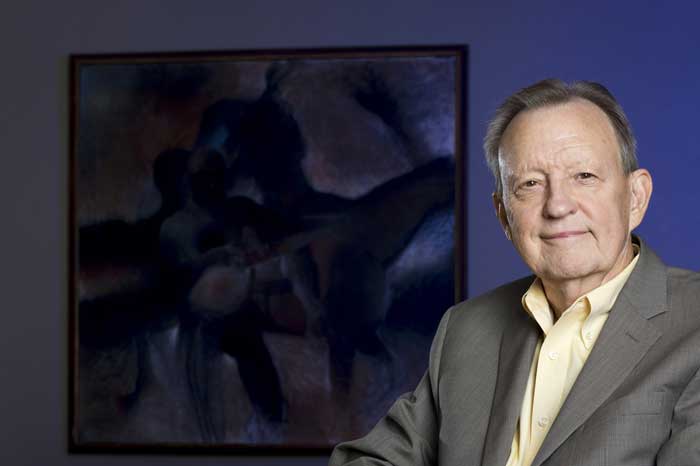Joel Anderson returns to UA Little Rock as Scholar in Residence
This fall, the faculty, staff, and students of the University of Arkansas at Little Rock will see a familiar face on campus.
Chancellor Emeritus Dr. Joel Anderson, who retired in June 2016 following a 45-year career at the university, has returned to UA Little Rock to work as a part-time Scholar in Residence at the Anderson Institute on Race and Ethnicity.
“I should say that I don’t intend to give up the joys of retirement,” said Anderson, who has spent his first year catching up on reading the newspaper, traveling with his wife, Ann, and visiting his three sons and five grandchildren.
“Racial and ethnic justice has been a concern of mine for a long time,” he said. “If by working in the Institute on Race and Ethnicity I could make a contribution on that front, I would like to do so.”
While volunteering at the institute which bears his name, Anderson will focus on development and grant writing and will work on community outreach programs. These programs include the Racial Attitudes in Pulaski County Conference and the Arkansas Civil Rights Heritage Trail.
“We are delighted to welcome back Dr. Anderson to campus as our Scholar in Residence, not least since the Anderson Institute is his creation and his legacy,” said Dr. John Kirk, director of the Institute on Race and Ethnicity. “Dr. Anderson’s community standing and passion for issues of race and ethnicity make him the perfect ambassador for the institute.”
Anderson plans to mentor a group working with the institute.
“I want to have a regular discussion meeting with a set group of students on various issues of race and ethnicity,” he said. “Before launching such a project, I want to get students involved in choosing the focus and shaping the approach. Conversations become more comfortable and honest when people get to know and trust each other.”
Anderson became interested in the Civil Rights Movement as a college student at Harding University in Searcy, which was segregated during the time Anderson attended in the early 1960s.
“Despite the official position of the administration, there were a few faculty members that quietly and privately would say segregation is not right,” he said. “That got my attention.”
During his tenure as chancellor, Anderson created the Chancellor’s Committee on Race and Ethnicity in 2006. Out of the committee’s work, the Institute on Race and Ethnicity was created in 2011 to work with Arkansas communities to end racial and ethnic injustice.

“That group recognized that race was the No. 1 issue in Arkansas,” Anderson said. “It’s the major issue that inhibits progress in the community and the state. The issues that are related to race and ethnicity are not going to just disappear.”
In 2016, the institute was renamed after Anderson to honor his “pivotal role in pursuing racial and ethnic justice in Arkansas.”
In 2016, the Arkansas Historical Association honored the institute for its work. The institute received the Diamond Award for the Arkansas Civil Rights Heritage Trail in recognition of excellence in public history engagement. It also received an award of merit for the Arkansas Civil Rights History Tour App created with the city of Little Rock. The app offers residents and visitors a new way to explore the city’s rich civil rights history.
Anderson is glad to return to campus.
“Besides seeing old friends and making new ones, few places are as stimulating and full of interesting people as a university campus,” he said. “When you retire, you find yourself interacting mostly with people your own age. I love the wisdom of the old, but I miss hearing those younger voices.”
